新目标八年级英语上册第9单元知识点-总结
人教新目标八年级英语上册Unit9知识点归纳汇总

人教新目标八年级英语上册Unit9知识点归纳汇总基本句型1Can you come to my party? 你能来我的派对吗?肯定回答:Yes, I can.Sure.Certainly.Of course. I’d like/love to.Yes, I’d like/love to.Sure, I’d like/love to.否定回答:No, I can’t. I …Sorry, I can’t. I …I am sorry, I can’t.I’m afraid not. I …No/Sorry, I’m not free/available.Sorry, I’d like/love to. But I …(说明:若不能来,则用上述回答来有礼貌地拒绝, 一般情况下需要说明不能接受邀请的原因以表示歉意。
因此省略号表示对不能去的情况的解释说明,需在本单元慢慢积累)小知识:come to one’s party 动词词组,意为“来某人的派对”小知识:I’d = I would总结:can的常见用法(了解即可)一、用于发出邀请。
e.g. Can you come to my birthday party?e.g. Can you go to the movie with me?二、表示能力。
e.g. I can sing and dance.三、表示请求。
e.g. Can you help me?回忆:情态动词have to与must的区别与联系共同点:两者都是情态动词。
区别:1)have to 因受环境或客观因素的影响,“不得不”做某事,其也常常翻译为“必须”。
(别人或环境逼自己)must是主观上严格要求自己,告诉自己“必须”做某事。
(自己逼自己)2)have to有人称,数与时态上的变化。
而must没有人称,数与时态的变化。
说明:一般来说情态动词没有人称与数的变化(have to是个例外),部分情态动词有时态上的变化(can与could)。
八年级上册英语第九单元知识点

八年级上册英语第九单元知识点(经典版)编制人:__________________审核人:__________________审批人:__________________编制单位:__________________编制时间:____年____月____日序言下载提示:该文档是本店铺精心编制而成的,希望大家下载后,能够帮助大家解决实际问题。
文档下载后可定制修改,请根据实际需要进行调整和使用,谢谢!并且,本店铺为大家提供各种类型的经典范文,如工作报告、工作计划、活动方案、规章制度、演讲致辞、合同协议、条据文书、教学资料、作文大全、其他范文等等,想了解不同范文格式和写法,敬请关注!Download tips: This document is carefully compiled by this editor. I hope that after you download it, it can help you solve practical problems. The document can be customized and modified after downloading, please adjust and use it according to actual needs, thank you!Moreover, our store provides various types of classic sample essays, such as work reports, work plans, activity plans, rules and regulations, speeches, contract agreements, documentary evidence, teaching materials, complete essays, and other sample essays. If you would like to learn about different sample formats and writing methods, please pay attention!八年级上册英语第九单元知识点八年级上册英语第九单元知识点笔记掌握英文语法和单词是学好英语的基础,可以通过背诵单词和语法知识来达到这个目的,平时学习的知识点也需要格外注意!以下是本店铺为大家带来的八年级上册英语第九单元知识点笔记,欢迎参阅呀!八年级上册英语第九单元知识点笔记连接代词和连接副词引导的宾语从句。
人教版新目标版八年级英语上册 Unit 9 Can you come to my party?单元知识归纳
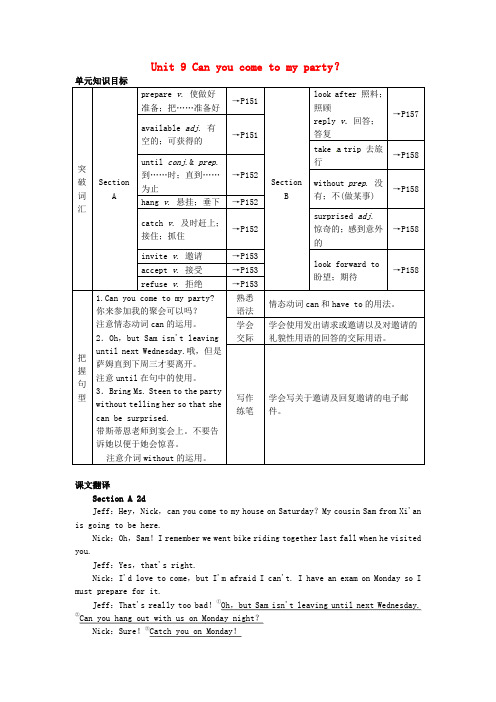
Unit 9 Can you come to my party?突破词汇SectionAprepare v. 使做好准备;把……准备好→P151SectionBlook after 照料;照顾reply v.回答;答复→P157 available adj. 有空的;可获得的→P151take a trip 去旅行→P158 until conj.& prep.到……时;直到……为止→P152without prep. 没有;不(做某事)→P158hang v. 悬挂;垂下→P152catch v. 及时赶上;接住;抓住→P152surprised adj.惊奇的;感到意外的→P158invite v. 邀请→P153look forward to盼望;期待→P158 accept v. 接受→P153refuse v. 拒绝→P153把握句型1.Can you come to my party?你来参加我的聚会可以吗?注意情态动词can的运用。
2.Oh,but Sam isn't leavinguntil next Wednesday.哦,但是萨姆直到下周三才要离开。
注意until在句中的使用。
3.Bring Ms. Steen to the partywithout telling her so that shecan be surprised.带斯蒂恩老师到宴会上。
不要告诉她以便于她会惊喜。
注意介词without的运用。
熟悉语法情态动词can和have to的用法。
学会交际学会使用发出请求或邀请以及对邀请的礼貌性用语的回答的交际用语。
写作练笔学会写关于邀请及回复邀请的电子邮件。
课文翻译Section A 2dJeff:Hey,Nick,can you come to my house on Saturday?My cousin Sam from Xi'an is going to be here.Nick:Oh,Sam!I remember we went bike riding together last fall when he visited you.Jeff:Yes,that's right.Nick:I'd love to come,but I'm afraid I can't. I have an exam on Monday so I must prepare for it.Jeff:That's really too bad!①Oh,but Sam isn't leaving until next Wednesday.②Can you hang out with us on Monday night?Nick:Sure!③Catch you on Monday!杰夫:嘿,尼克,星期六你能来我家吗?我来自西安的表弟萨姆打算到这儿。
八年级上册英语第九单元知识点讲解

Unit 9 when was he born?Section A 解析与拓展1.talk about意为“谈论”,talk为不及物动词,后跟人时常常说talk to sb.或talk with sb.。
He was talking to a friend.他在和一个朋友谈话。
What are they talking about?他们在谈论什么?2.sports(有关)体育运动的,体育运动用的。
如:a sports festival体育运动节a sports magazine体育杂志3.make(made,made)此词是一个很活跃的及物动词,常用的用法主要有:做,制造;构成,组成;使make a cake做糕饼make paper造纸make friends交朋友make a mistake犯错误make a fire生火,make a living谋生。
4.list,此处为名词,意为“名单、目录”。
如:a shopping list购物单make a list of things one must do将必须做的事情列一表5.born出生,出世;bear的过去分词:▲be born出生,常跟介词in或on(具体至某一日用on,不具体到日的时间均用in)。
He was born in England.他出生于英国。
His mother was born on May 4,1960.I was born in summer in 1980.我出生于1980年夏天。
6.under在……底下,在……下方swim under water在水底潜泳。
其反义词为over。
另一组为below—above7.photo相片,其复数为photos,take photos照相(=take pictures)①other其他的,另外的,其余的(人或物)【辨析】other, the other与another8.other adj.其余的,其他的,9.the other指两者中之第二个,另一个on the other hand另一方面。
八年级上英语九单元知识点
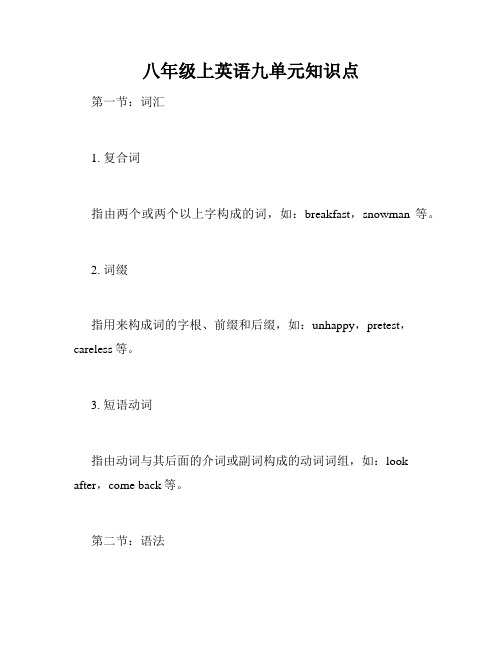
八年级上英语九单元知识点第一节:词汇1. 复合词指由两个或两个以上字构成的词,如:breakfast,snowman等。
2. 词缀指用来构成词的字根、前缀和后缀,如:unhappy,pretest,careless等。
3. 短语动词指由动词与其后面的介词或副词构成的动词词组,如:look after,come back等。
第二节:语法1. 一般现在时用于表示现在的状态、习惯、事实等,如:I always play football on Sundays.2. 现在进行时用于表示正在进行的动作,如:He is playing basketball now.3. 一般过去时用于表示过去的动作或状态,如:I watched TV last night.4. 过去进行时用于表示过去正在进行的动作,如:He was reading a book at 8 o'clock yesterday evening.5. 一般将来时用于表示将来的动作或状态,如:I will go to the park tomorrow.6. be动词的用法表示人或物的状态或特征,如:He is tall.第三节:阅读理解1. 标题排除法通过排除文章的内容,推断出正确的标题。
2. 线索法通过文章中的明显线索,推断出正确的答案或信息。
3. 推断法通过已知信息和推理,推断出未知信息。
第四节:写作技巧1. 合理安排作文结构作文分明确的开头、中间和结尾。
2. 丰富词汇和句子结构用多种不同的词汇和句型结构来增强文章的表达力。
3. 注意作文的连贯性和逻辑性语言表达应该是连贯的,内容也应该有逻辑性。
【人教版新目标】英语八年级上册Unit9单元教学内容

【人教版新目标】英语八年级上册Unit9
单元教学内容
人教版新目标英语八年级上册Unit9单元教学内容
本单元主要研究了一些与旅行有关的词汇和短语,包括交通工具、景点、常见问题等。
同时,还研究了一些表达方向和位置的句型,可以有效地帮助学生在旅行中寻找方向和交流。
本单元的教学内容主要包括以下几个方面:
单词和短语
通过图片和实物等多种形式,学生研究了与旅行相关的常见词汇和短语。
比如:plane, train, subway, sightseeing等。
句型
学生通过操练各种常用的表达方向和位置的句型,如:Excuse me, how can I get to the museum? Turn left at the second corner. It's on your right. 可以更好地理解并掌握这方面的知识点,并在旅行中自
如地沟通交流。
文化知识
本单元还介绍了一些国外旅游景点,比如:The Great Wall、The Statue of Liberty等。
帮助学生了解各国文化和风俗,提高跨文
化交际的能力。
在教学中,我们可以通过多媒体资源、游戏和互动讨论等多种
形式让学生参与其中,帮助他们更好地理解和掌握本单元的知识点。
总之,本单元不仅学习了与旅行相关的基础知识,还提高了学
生的沟通交流和文化意识,是一份非常实用的英语教材。
八年级英语上册Unit9Canyouetomyparty知识点归纳(新版)

Unit9 Can you e to my party?短语:1.on Saturday afternoon在周六下午2.prepare for为……做准备prepare to do sth 准备做某事3.go to the doctor去看医生4.have the flu患感冒5.help my parents帮助我的父母6.e to the party来参加聚会7.meet my friend会见我的朋友8..another time其他时间st fall=last autumn去年秋天10.go to the party去聚会11.hang out with sb 和某人一起闲逛12.the day after tomorrow后天the day before yesterday前天13.have a piano lesson上钢琴课14.accept an invitaton接受邀请14.turn down an invitation拒绝邀请15.look for寻找look after=take care of照顾16.take a trip去旅行17 at the end of this month这个月末 18.lookforward to doing盼望;期待19.the opening of… ……的开幕式/落成典礼 20.reply in writing书面回复21.go to the concert去听音乐会not…until直到……才22.too much homework太多作业do homework做家庭作业23.after school放学后24.help out分担工作,解决难题25,hear from sb 收到某人的来信26.any of the party preparations派对准备中的任何事用法:1.invite sb. to do sth.邀请某人做某事invite sb to sp 邀请某人去某地2.what引导的感叹句结构:What+a/an+adj.+可数名词单数(+主语+谓语)!What+adj.+名词复数/不可数名词(+主语+谓语)!5.see sb. do sth. see sb.doing sth.10.What’s today?今天是什么日子?What’s the date today?今天几号?What day is it today?今天星期几?11.Thanks for asking= Thanks for inviting = Thanks for your invitantion谢谢你的邀请12.refuse to do sth 拒绝做某事。
新目标英语八年级(上) Unit 9 知识要点归纳

新目标英语八年级(上) Unit 9 知识要点归纳佚名【期刊名称】《中学生英语(阅读与写作)》【年(卷),期】2016(000)012【总页数】1页(P20)【正文语种】中文1.But Sam isn’t leaving until nextWednesday.但是萨姆直到下周三才要离开。
2.Thank you somuch for planning this.非常感谢你的计划。
3.My family is taking a trip to Wuhan at the end of thismonth to visitmy aunt and uncle.这个月底我们一家人将要去武汉探望我婶婶和叔叔。
4.I’d still be glad to help outwith any of the party preparations,like planning the games.我还是很乐意能帮助你做任何聚会的准备工作,像策划游戏呀。
5.As Iam sure you know by now,our favorite teacher,Ms.Steen,is leaving soon to go back to the US.正如我确定你刚刚知道了,我们最喜欢的老师Steen 不久后将回到美国。
6.To show how much we are going tomiss her,let’s have a surprise party for her next Friday the 28th!为了表示我们多么想念她,我们为她在下周五28号举办一个惊喜晚会吧。
7.Bring Ms.Steen to the party without telling her so that she can be surprised.在Steen老师毫不知情的情况下把她带过来,这样她一定会感到惊喜的。
八年级上册英语unit9重要知识点

八年级上册英语unit9重要知识点八年级上册英语Unit 9重要知识点本文将为大家介绍八年级上册英语Unit 9的重要知识点,包括单词、语法、听力技巧和写作技巧等方面。
希望能为大家的学习提供帮助。
一、单词1. purchase:购买2. discount:折扣3. receipt:收据4. customer:顾客5. service:服务6. refund:退款7. guarantee:保证8. complain:投诉9. exchange:交换10. recommend:推荐以上是Unit 9中较为重要的单词,大家可以通过记忆卡片、词汇表等方式进行练习。
二、语法1. 区别must, may, mightUnit 9中,我们将学到情态动词must、may、might的用法。
大家需要了解它们之间的区别,例如:Must表示一定,必须的意思,例如:We must clean out the garage this weekend.(这个周末我们必须清理车库)May表示可能,可能发生的意思,例如:He may arrive late.(他可能会来晚一点)Might表示可能,有可能的意思,但比may的可能性更小,例如:I might be able to help you.(我可能能帮你)2. 区别realize和recognizeRealize和recognize都是“意识到”的意思,但它们的用法不同。
Realize后接具体的事物,例如:I realized that I had left my phone at home.(我意识到我把手机落在了家里)Recognize是更常用的词,它与remember不同,能表示重新认出或重新确定一个人或物。
例如:I didn't recognize her at first because she had dyed her hair.(一开始我没认出她,因为她把头发染了)三、听力技巧1. 在听力材料播放前,先认真阅读题目在做Listening部分的时候,建议大家在听力材料放出之前,先仔细阅读题目与选项。
八年级上册英语unit9知识点整理
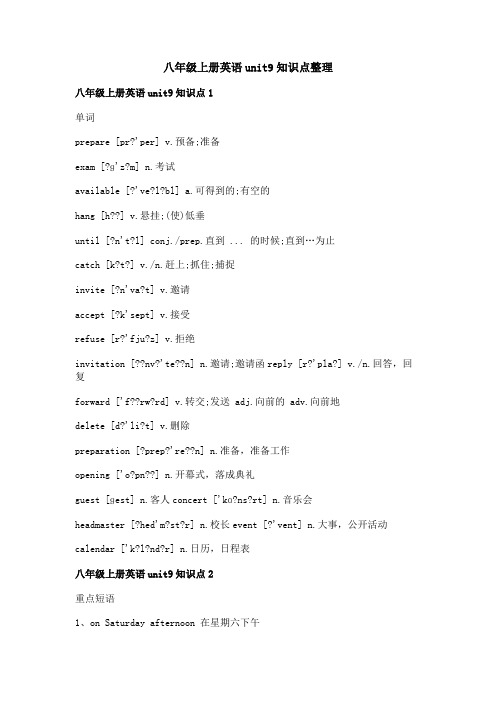
八年级上册英语unit9知识点整理八年级上册英语unit9知识点1单词prepare [pr?'per] v.预备;准备exam [?ɡ'z?m] n.考试available [?'ve?l?bl] a.可得到的;有空的hang [h??] v.悬挂;(使)低垂until [?n't?l] conj./prep.直到 ... 的时候;直到…为止catch [k?t?] v./n.赶上;抓住;捕捉invite [?n'va?t] v.邀请accept [?k'sept] v.接受refuse [r?'fju?z] v.拒绝invitation [??nv?'te??n] n.邀请;邀请函reply [r?'pla?] v./n.回答,回复forward ['f??rw?rd] v.转交;发送 adj.向前的 adv.向前地delete [d?'li?t] v.删除preparation [?prep?'re??n] n.准备,准备工作opening ['o?pn??] n.开幕式,落成典礼guest [ɡest] n.客人concert ['kɑ?ns?rt] n.音乐会headmaster [?hed'm?st?r] n.校长event [?'vent] n.大事,公开活动calendar ['k?l?nd?r] n.日历,日程表八年级上册英语unit9知识点2重点短语1、on Saturday afternoon 在星期六下午2、have to 必须3、 prepare for 准备4、go to the doctor 去看病5、have the flu 患流感6、help my parents 给父母帮忙7、come to the party 参加晚会8、meet my friend 见朋友9、go to the party 参加晚会10、too much homework 太多的家庭作业11、go to the movies 去看电影12、another time 下次,另外的时间,别的时间13、last fall 去年秋天14、hang out 闲逛15、after school 放学后16、on the weekend=on weekends 在周末17、study for a test 备考18、visit grandparents 拜访爷爷奶奶19、the day before yesterday 前天20、the day after tomorrow 后天21、have a piano lesson 上钢琴课22、look after 照看23 make an invitation 制定邀请24、accept an invitation 接受邀请 turn down (refuse) an invitation 拒绝邀请25、take a trip to Wuhan 去武汉旅游26、at the end of this month 在本月底27、look forward to + doing 期望/渴望28、the opening of… 开幕/开业29、reply in writing 写回信30、go shopping 购物31、do homework 做作业32、go to the concert 参加音乐会33、not…until… 直到......才......八年级上册英语unit9知识点3重点句型1. --Can you come to my party on Saturday afternoon? 星期六下午你能参加我的晚会吗? --Sure, I’d love to. / Sorry,I can’t. I have to prepare for an exam. 当然,我愿意去。
八年级上册unit9英语知识点

八年级上册unit9英语知识点Unit 9是八年级上册英语中的重点单元之一,主要涉及动词的时态、比较级和最高级、情态动词、被动语态等知识点。
本文将为大家详细讲解这些知识点。
1. 时态在Unit 9中,涉及的时态包括一般现在时、一般过去时、现在进行时、过去进行时和一般将来时等常见时态。
一般现在时表示现在经常或习惯性的动作或状态,它的构成为主语 + 动词原形。
例如:I usually play football after school.一般过去时表示过去某一时刻或一段时间内发生的动作或状态,它的构成为主语 + 动词的过去式。
例如:I went to the cinema last night.现在进行时表示正在进行的动作,它的构成为主语 + am/is/are+ 动词 + -ing。
例如:He is watching TV now.过去进行时表示过去某一时刻正在进行的动作,它的构成为主语 + was/were + 动词 + -ing。
例如:I was sleeping when you called me.一般将来时表示将来将要发生的动作或状态,它的构成为主语+ will + 动词原形。
例如:I will visit my grandparents next weekend.2. 比较级和最高级在Unit 9中,我们还需要掌握形容词和副词的比较级和最高级。
以英语中的形容词和副词为例,比较级和最高级的构成如下:形容词的比较级和最高级:比较级:原形 + -er,例如:bigger,more interesting.最高级:the + 原形 + -est,例如:the biggest,the most interesting.副词的比较级和最高级:比较级:原形 + -er,例如:faster,more quickly.最高级:the + 原形 + -est,例如:the fastest,the most quickly.需要注意的是,有些形容词和副词的比较级和最高级不是加 -er 或 -est,而是在前面加 more 或 most,例如:interesting,more interesting,the most interesting.3. 情态动词情态动词包括 can,could,may,might,will,would,shall,should,must,need,dare等,它们用来表示说话人的意愿、推测、建议等。
八年级上册英语unit9知识点总结
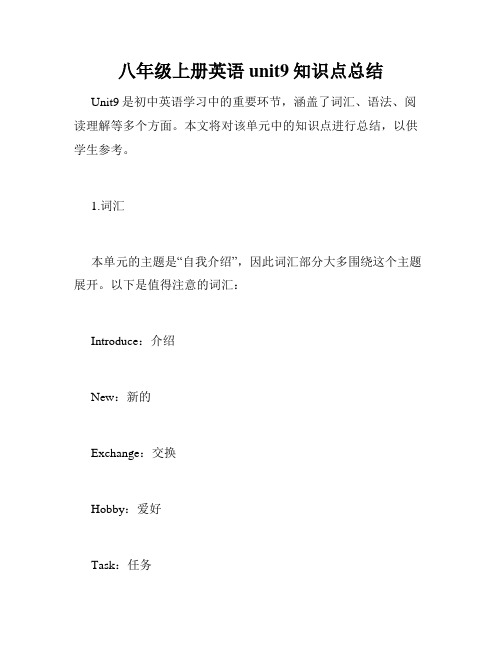
八年级上册英语unit9知识点总结Unit9是初中英语学习中的重要环节,涵盖了词汇、语法、阅读理解等多个方面。
本文将对该单元中的知识点进行总结,以供学生参考。
1.词汇本单元的主题是“自我介绍”,因此词汇部分大多围绕这个主题展开。
以下是值得注意的词汇:Introduce:介绍New:新的Exchange:交换Hobby:爱好Task:任务Questionnaire:调查问卷Cooperation:合作2.语法本单元语法部分主要涉及动词时态和疑问句。
(1)动词时态本单元主要包括以下时态:现在进行时:am/is/are+动词ing一般现在时:动词原形一般过去时:动词过去式以下是一些例句:-I am studying English in the library.-He likes soccer very much.-We went skiing last weekend.(2)疑问句疑问句的构成方式是将主语和助动词调换位置。
以下是一些例句:-Are you new here?-Do you like playing basketball?-Did you have a good weekend?3.阅读理解本单元的阅读理解主要是一些海报、广告和手册的介绍。
学生需要学会通过阅读理解中提供的信息进行判断,了解商品和服务的基本信息。
在阅读理解的过程中,需要学生注意时间和准确性。
阅读理解也可以帮助学生拓宽阅读面,并培养英语口语和写作的能力。
4.写作本单元的写作主题是“自我介绍”,学生需要尽可能详细地介绍自己的基本情况。
以下是一些写作技巧:首先,应该简单介绍自己的姓名、学校和年级;其次,可以介绍一下自己的家庭成员和爱好;最后,可以适当表达一下自己的期望和目标,如未来想要成为什么样的人等。
在写作过程中,要尽量避免使用翻译软件,以保证语言的准确性。
同时,要注重细节,提升文章质量。
总之,八年级上册英语Unit9包括了多个不同方面的知识点,包括词汇、语法、阅读理解和写作等。
2019-2020年八年级英语上册 第9单元解读 人教新目标版

2019-2020年八年级英语上册第9单元解读人教新目标版一、课标表述本单元主要围绕谈论自己崇拜的名人及有关名人的职业生涯而展开的。
Section A部分,通过学习,让学生了解成功人士的生活经历,掌握有关职业的表达。
Section B是在Section A的基础上,通过学习让学生谈谈自己过去的生活经历,谈论自己和别人的成就,并学会介绍自己和周围同学的生活经历。
通过学习名人的生平和主要事迹激励自己,建立面对困难不退缩的信心。
二、目标分解本单元学习后,要求学生掌握的目标有:1.认知目标:(1)掌握词汇:achievement, record, skater, violist, pianist, start, stop, first went, first,had, learned, talented, loving, creative, outstanding, unusual……(2)掌握句式:Who’s that?That’s Deng Yaping. She is a great ping –pong player.When was she/ he born?When did she star/ become …When she was……years old(3)掌握语法:掌握“被动语态”,及由when引导的状语从句;How long /when 引导的特殊疑问句;进一步全面地学习一般过去时态。
2.能力目标:听:能听懂谈论杰出人物的对话材料。
说:能够谈论自己过去的生活经历。
读:能读懂描述杰出人物的文章。
写:能够写介绍自己和周围同学的生活经历的短文。
3.情感目标:通过学习崇拜的人的事迹,开阔学生视野,激励学生脚踏实地、积极进取。
三、目标重构1.本单元需掌握的知识点是:(1)明确一般现在时态和一般过去时态的不同特点,并能熟练区分、使用以上两个时态。
(2)掌握一般过去时态的以how long , when , where 等疑问词开头的特殊疑问句。
八年级英语上册第9单元知识点总结

Unit9Can you come to my party?一、重点短语1.prepare for...2.go to the doctor3.hve the flu4.on Saturday afternoon5.have to do sth6.go to the movies7.be available8.too much homework9.another time10.thanks for asking11.not...until...12.hang out13.study for a math text12.the day before yesterday13.the day after tomorrow14.What's today?15.look after16.accpect an invitation17.make an invitation18.turn down an invitation19.improve my English20.the best way to do sth21.take a trip to...22.at the end of...23.be glad to do sth24.help out25.have a surprise party26.by this Friday27.be surprised to do sth28.look forward to29.hear from二、重点句型1.---Can you come to my party on Saturday?---Sure,I'd love to.2.---Can he go to the party?---No,he can't.3.I look forward to hearing from you all.4.Bring Ms.Steen to the party without telling her so that she can be surprised.三、语法情态动词can的用法及表示邀请的句型四、重要考点1.prepare(v)准备prepare for sth.为…做准备for的宾语不是动作的承受者,而是表示准备的目的. prepare to do sth准备做某事。
人教版新目标八年级英语上册第九单元大归纳

29.reply in wring 书面(shūmiàn)回复 30.do homework 做家庭作业 31.go to the concert 去看音乐会 32.not…until 直到…才
第四页,共17页。
二、用法(yònɡ fǎ)集萃
1.invite sb. to do sth. 邀请某人做某事 2.What引导的感叹句结构: What+ a/an +形容词+可数名词单数+ (主语+谓语(wèiyǔ)) What+形容词+名词复数/不可数名词+ (主语+谓语(wèiyǔ))
第六页,共17页。
三、语法专项 情态动词(dòngcí)can表示邀请
★教材典句 1.-Can you come to my party on Sunday?
周日你能来参加我的聚会(jùhuì)吗? -Sure, I’d love to. 当然,我很愿意。 2.-Can you go to the movies on Sunday ?
4.be sad to do sth. 做某事很悲伤
第五页,共17页。
6.the best way to do sth. 做某事的最好方式 7.have a surprise party for sb. 为某人举办一个(yī ɡè)惊喜派对 8.look forward to doing sth.期盼做某事 9.reply to sb./sth. 答复某人/某事 10.What’s today?今天是什么日子? What’s the date today?今天几月几号? What day is it today?今天星期几?
第二页,共17页。
19.the day before yesterday前天 20.the day after tomorrow 后天 21.have a piano lesson 上钢琴课 22.look after 照顾(zhào gù) 照料 23.accept an invitation接受邀请 24.turn down an invitation 拒绝邀请 25.take a trip 去旅行 26.at the end of this month 这个月末 27.look forward to 期盼;期待 28.the opening of … …的开幕式/落成典礼
新版新目标英语八年级上册unit9知识点总结(K12教育文档)
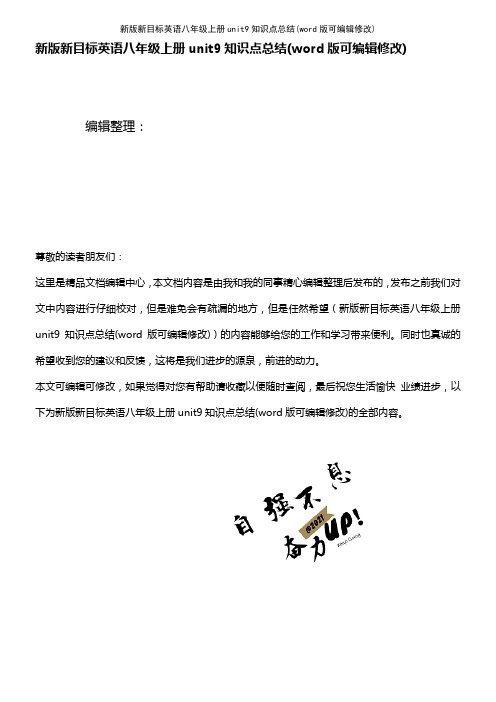
新版新目标英语八年级上册unit9知识点总结(word版可编辑修改) 编辑整理:尊敬的读者朋友们:这里是精品文档编辑中心,本文档内容是由我和我的同事精心编辑整理后发布的,发布之前我们对文中内容进行仔细校对,但是难免会有疏漏的地方,但是任然希望(新版新目标英语八年级上册unit9知识点总结(word版可编辑修改))的内容能够给您的工作和学习带来便利。
同时也真诚的希望收到您的建议和反馈,这将是我们进步的源泉,前进的动力。
本文可编辑可修改,如果觉得对您有帮助请收藏以便随时查阅,最后祝您生活愉快业绩进步,以下为新版新目标英语八年级上册unit9知识点总结(word版可编辑修改)的全部内容。
Unit9 Can you come to my party?1。
Can you come to my party?Can you ...。
.。
? 句式表示发出邀请,多用于口语肯定回答:Sure,I’d love to. Sure,I’d like to。
That would be nice, thanks!否定回答:Sorry,I can’t.;No,thanks。
I’d love to, but I’m afraidI have no time. I’m afraid notcan 用法(1)can表示有能力做或者能够发生,能,会=be able toI can run very fast.(2)can 表示允许,可以 You can put your bike here。
(3)c an’t用于否定句,表示某事不真实。
He can't sleep through all this noise.(4)can 表示猜测、可能性,可能;可能会 What can he mean?2.have to /must /need(1)含义和用法上的区别have to 强调客观上需要做某事,即表示外界条件的需要不得不做某事,含有形势逼迫的意味must 强调说话者主观上认为必须做某事,含有主观判断的意味。
- 1、下载文档前请自行甄别文档内容的完整性,平台不提供额外的编辑、内容补充、找答案等附加服务。
- 2、"仅部分预览"的文档,不可在线预览部分如存在完整性等问题,可反馈申请退款(可完整预览的文档不适用该条件!)。
- 3、如文档侵犯您的权益,请联系客服反馈,我们会尽快为您处理(人工客服工作时间:9:00-18:30)。
Unit9Canyoucome to my party?话题:Invitations教学目标:1. Learn how to make, accept, decline invitation.2. Talk about obligations with“have to”3. Talk abouttheschedule.教学重难点:情态动词Can的用法知识点:1.情态动词can情态动词是一种本身有一定的词义,表示说话人的情绪、态度或语气的动词,但不能单独作谓语,只能和其他动词原形构成复合谓语,没有人称和数的变化情态动词数量不多,但用途广泛,主要有:can(could), may(might), must,need, ought to,dare (dared),s hall (should),will (would)can是一个常见的情态动词错误!含义5点1)表示能力(如体力和脑力方面),意为“能、会”Canyouspeak Chinese?Can you playbasketball?2)表示请求或者允许,多用在口语中,意为“可以、能”等客观条件的允许。
用于疑问句中用来提出要求,用于否定句中表示不允许。
Can you help me?You can’t playthe computer3)表示可能,理论上的可能He can beout now.It can’tbu sunny allthetime.4)表示说话人的猜测、怀疑、不肯定等,主要用于否定句、疑问句、感叹句中,带哟感情色彩。
How canyo be sorude!Can he beback?5)could可以作为can的过去式,也可以在提出请求时表示委婉。
Hecouldsavethe little boy.Could you help me?拓展辨析can与may 4点1)表示“许可、准许”,此时与can同义,可以互换使用You may/can go to the cinema this evening.☆注意:表许可时其答语可以用“Yes,you may.”但是由于用may做肯定回答语气显得生硬、严肃,因此一般用Yes, please. /Certainly./Of course.这些回答显得热情、客气。
拒绝对方时,其答语可以用No,you mustn’t./No,you can’t./ Sorry,youcan’t. /No, pleasedon’t--MayI come in?--Yes,please--May I use your ruler?--Certainly.Here you are.2)表示可能性时,常用在肯定句中,意为“可能、也许”Hemay bevery busy now.He said that she might notbe at worktoday.3)can和may都可以表示推测。
can通常用在否定句和疑问句中,may通常用在肯定句和否定句中。
虽然两者都可以用于否定句,但是程度不同,can’t的语气比may not更强。
It can’tbe true.It may not be true.4) 表示希望、祈求、祝愿,常可以译为“祝愿”May you havea good time.Mayyou be happy.练习题1)—Would you liketo goswimming with me this afternoon?—I’d love to,but I’m afraid I _______.Ihavetoo much work to do.2)—________ I useyour dictionary?—Ofcourseyou can.3) —________Iknow your name?—Sure.My name is HanHuimei.4) Idon’t understand this sentence. ________youexplain it to me?5)—That sweater _______ be yours.—No,it_______bemine.Mineis over there.6) Jimleft his Englishbook at home. He_______ borrowonefrom other students.7)_______ you have a merry Christmas and happy New Year!8)—May Ipick aflower in thegarden?—No, you _______.2.must与have to表示义务,即必须或者不得不做的事表示“必须、一定要”,多强调说话人的主观看法,否定式mustn’t表示“一定不要,禁止”Youmust see the doctor.Must you go soon?对于must开头的一般疑问句,如果要做否定回答,可以用needn’t, don’t have to,不能用mustn’t--MustIcome overtonight?--No, you needn’t表示客观需要时,常用haveto, have to 为情态动词词组,第三人称单数为hasto.过去式为hadto.Haveto的疑问句,否定句都要借助于助动词do,does.did来完成。
Eg. He has to stay athome. 他不得不呆在家里。
Why doIhaveto do everything? 为什么事事都得我来干。
练习题1)You_______swim in thispart of the lake. It’s dangerous.2)—________ I tell him the truthright now?—No, you________. You can tell him aboutit later.3)---Do we mush finishour homework thisafternoon?---Yes, you______.A.must B.canC.may D.need4)我不必呆在这里。
___________________________________________________________________________5)杰克生病了,他不得不呆在家里。
3.prepare v.做好准备,把……准备好eg. My mother alwayspreparesa big breakfast for me every morning.妈妈每天早上总是为我准备一顿丰盛的早餐。
错误!为……做准备prepare for 为……做准备make preparations forgetready for……eg.Their teacher toldthem to prepare for the coming speech contest. The smiths are making preparations for this journey.○2准备去做epare to do sth. 准备去做……getready to doMake preparations to do错误!prepare sb.for 使某人为……而准备We must prepare him for the bad news.我们必须使他为这个坏消息做好准备。
错误!be preparedfor/to doThey are prepared foranything that might happen.他们已准备好了应对任何可能发生的事情。
○5preparation 准备,准备工作可数名词错误!be in preparation 正在准备中Her daughter’swedding is in preparation.她女儿的婚礼正在准备中。
4.so that以至于,以便于Eg.This littleboy savedeverycoin so that he couldbuy hismotherapresenton Mother’s Day.这个小男孩省下每一枚硬币,这样才能在母亲节那天给他的妈妈买份礼物。
1)辨析sothat 与so…thatso that 表示目的(多)表结果She worked hardso that everything wouldbe ready intime.so…that 表结果She spoke so quietly that I could hardly hear her.2)so that 与inorderthat 都表示目的后加从句3)in orderto 与so as to 后加动词原形4)so…thatsuch…thatHe is so good astudent that we all like him.= Heis such a goodstudent that weall likehim.名前such 形副so 多多少少都用so5) so…that后从句用否定太……而不能too…to本身有否定not…enough to do形容词副词置于enough,前用not表否定5.by错误!表示时间,意为“不迟于,在……之前”Please hand in your homework by 6p.m.请在下午六点前交作业。
错误!表示方式,方法,手段等,后常接无冠词的名词或者动名词,意为“通过;靠;用”Don’tjudge a person byappearance.请不要以貌取人。
Ilearned thissong by listening to the radio.我通过听广播学了这首歌。
错误!表示交通路线或者工具,后接不用冠词的名词,意为“乘;坐;骑;”by bus/plane/train/taxi乘公交车/飞机/火车/出租车bybike骑自行车byland/sea/air 经陆路海陆空中路线错误!表示位置,意为“在……旁边”Theywentcamping bythe river. 他们去了河边露营。
6.refuse v. 拒绝eg.She refusedtheirinvitation.她拒绝了他们的邀请。
错误!refusesb./sth.拒绝某人/某事错误!refuse to do sth. 拒绝做某事Irefuse toanswer thatquestion.错误!refuse 范围较广refuse a fact 不承认事实turn down把音量调低,拒绝对象通常是提案,建议decline谢绝;婉拒Shedeclined tohavedinner with h er friend.7.available adj.有空的,可获得的Eg.The doctor isnot availablenow.医生现在没空。
